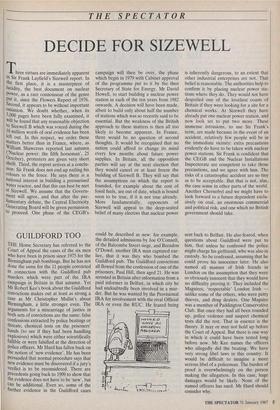THE SPECTATOR
DECIDE FOR SIZEWELL
Three virtues are immediately apparent in Sir Frank Layfield's Sizewell report. In the first place, it is a masterpiece of lucidity, the best document on nuclear Power, as a rare connoisseur of the genre put it, since the Flowers Report of 1976. Second, it appears to be without important omission. We doubt whether, when its 3,000 pages have been fully examined, it will be found that any reasonable objection to Sizewell B which was voiced during the 16 million words of oral evidence has been left out. In this respect, we order these matters better than in France, where, as William Shawcross reported last autumn (Nuclear power: the fifth horseman', 25 October), protesters are given very short shrift. Third, the report arrives at a conclu- sion: Sir Frank does not end up nailing his colours to the fence. He says there is a national interest in building a pressurised water reactor, and that this can best be met at Sizewell. We assume that the Govern- ment will agree, and that after the par- liamentary debate, the Central Electricity Generating Board will be given permission to proceed. One phase of the CEGB's campaign will then be over, the phase which begin in 1979 with Cabinet approval of the programme put to it by the then Secretary of State for Energy, Mr David Howell, to start building a nuclear power station in each of the ten years from 1982 onwards. A decision will have been made, albeit to build only about half the number of stations which was so recently said to be essential. But the weakness of the British approach to these matters is then all too likely to become apparent. In France, there would be no question of second thoughts. It would be recognised that no nation could afford to change its mind every few months about future power supplies. In Britain, all the opposition parties will say at the next election that they would cancel or at least freeze the building of Sizewell B. They will say that the assumptions on which the report is founded, for example about the cost of fossil fuels, are out of date, which is bound soon to be true, if it is not true already. More fundamentally, opponents of Sizewell will appeal to the deep-seated belief of many electors that nuclear power is inherently dangerous, to an extent that other industrial enterprises are not. That belief is reasonable. The authorities help to confirm it by placing nuclear power sta- tions where they do. They would not have despoiled one of the loveliest coasts of Britain if they were looking for a site for a chemical works. At Sizewell they have already put one nuclear power station, and now look set to put two more. These immense intrusions, to use Sir Frank's term, are made because in the event of an accident, relatively few people will be in the immediate vicinity: extra precautions evidently do have to be taken with nuclear power stations. Sir Frank is confident that the CEGI3 and the Nuclear Installations Inspectorate are competent to take those precautions, and we agree with him. The risks of a catastrophic accident are so tiny as to be acceptable. But that is not, alas, the case some in other parts of the world. Another Chernobyl and we might have to look forward to a future dependent exclu- sively on coal, an enormous commercial and political risk, and one which no British government should take.



































 Previous page
Previous page